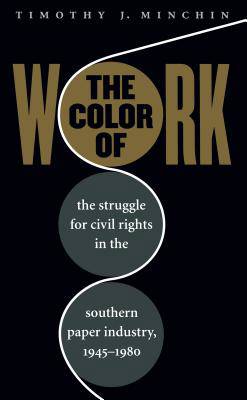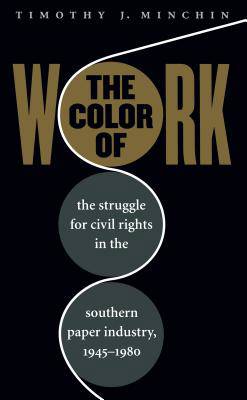
- Afhalen na 1 uur in een winkel met voorraad
- Gratis thuislevering in België vanaf € 30
- Ruim aanbod met 7 miljoen producten
- Afhalen na 1 uur in een winkel met voorraad
- Gratis thuislevering in België vanaf € 30
- Ruim aanbod met 7 miljoen producten
Zoeken
Color of Work
The Struggle for Civil Rights in the Southern Paper Industry, 1945-1980
Timothy J Minchin
Paperback | Engels
€ 64,45
+ 128 punten
Omschrijving
Histories of the civil rights movement have generally overlooked the battle to integrate the South's major industries. The paper industry, which has played an important role in the southern economy since the 1930s, has been particularly neglected. Using previously untapped legal records and oral history interviews, Timothy Minchin provides the first in-depth account of the struggle to integrate southern paper mills.
Minchin describes how jobs in the southern paper industry were strictly segregated prior to the 1960s, with black workers confined to low-paying, menial positions. All work literally had a color: every job was racially designated and workers were represented by segregated local unions. Though black workers tried to protest workplace inequities through their unions, their efforts were largely ineffective until passage of the 1964 Civil Rights Act opened the way for scores of antidiscrimination lawsuits. Even then, however, resistance from executives and white workers ensured that the fight to integrate the paper industry was a long and difficult one.
Minchin describes how jobs in the southern paper industry were strictly segregated prior to the 1960s, with black workers confined to low-paying, menial positions. All work literally had a color: every job was racially designated and workers were represented by segregated local unions. Though black workers tried to protest workplace inequities through their unions, their efforts were largely ineffective until passage of the 1964 Civil Rights Act opened the way for scores of antidiscrimination lawsuits. Even then, however, resistance from executives and white workers ensured that the fight to integrate the paper industry was a long and difficult one.
Specificaties
Betrokkenen
- Auteur(s):
- Uitgeverij:
Inhoud
- Aantal bladzijden:
- 296
- Taal:
- Engels
Eigenschappen
- Productcode (EAN):
- 9780807849330
- Verschijningsdatum:
- 30/07/2001
- Uitvoering:
- Paperback
- Formaat:
- Trade paperback (VS)
- Afmetingen:
- 156 mm x 234 mm
- Gewicht:
- 449 g

Alleen bij Standaard Boekhandel
+ 128 punten op je klantenkaart van Standaard Boekhandel
Beoordelingen
We publiceren alleen reviews die voldoen aan de voorwaarden voor reviews. Bekijk onze voorwaarden voor reviews.











